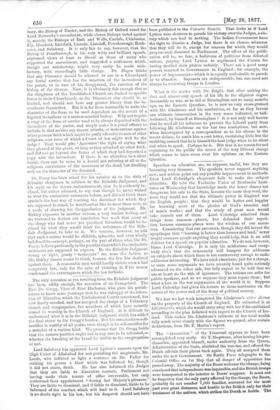Lord Salisbury has approved Lord Lytton's censure upon the High
Court of Allahabad for not punishing the magistrate, Mr. Leeds, who inflicted so light a sentence on Mr. Fuller for striking his groom a blow which was followed by, though it did not cause, death. He has also informed the Judges that they are liable to Executive censure, Parliament not having made their tenure of office irrevocable, but only authorised their appointment "during her Majesty's pleasure." They are liable to dismissal, and if liable to dismissal, liable to be Informed of the conduct which will lead to it. Lord Salisbury is no doubt right in his law, but his despatch should not have been published in the Calcutta Gazette. That looks as if Lord Lytton were desirous to parade his victory over the Judges, a vic- tory which can lead to nothing. The Indian Government have the right to dismiss a Judge, but there is no chance whatever that they will do it, except for reasons for which they would propose such dismissal to Parliament. The effect of the publi- cation will be, we fear, a hailstorm of petitions from defeated suitors, praying Lord Lytton to reprimand the Courts for having decided their plaints unfairly. There are a good many powers reserved to Government in England—for example, the power of impressment—which it is equally undesirable to parade or to abandon. Bayonets are indispensable, but one need not always be reviewing troops in London.


































 Previous page
Previous page